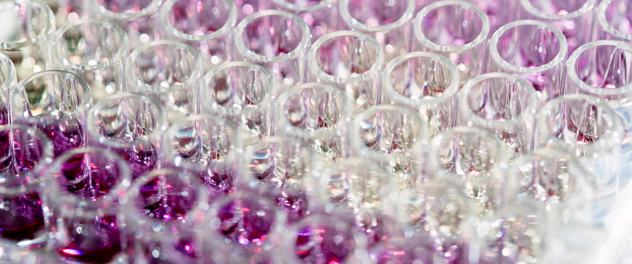 Driving the development of new cancer drugs
Driving the development of new cancer drugs
Our investigators are striving to improve cancer care for patients by developing better drugs through early clinical trials and using pharmacogenetics to customize treatment.
Overview
The Experimental Therapeutics Program develops new, more-effective cancer treatments that have fewer side effects than do standard cancer therapies, such as chemotherapy. Our program evaluates the next generation of potential cancer drug targets and some of the small molecules that interact with them, while helping move the current generation of potential anti-cancer drugs forward through preclinical and clinical studies.
Our program brings together cancer researchers from a variety of disciplines throughout Mayo Clinic who focus on research in four main areas:
- Studying signaling pathways involved in cell survival and proliferation to better define cellular responses to existing anti-cancer treatments and to identify potential new therapeutic targets
- Clarifying biological, biochemical and pharmacological aspects of the action of new anti-cancer drugs and identifying biochemical and genetic changes that allow tumor cells to resist these agents
- Identifying genetic and genomic contributions to individual differences in response (efficacy and toxicity) to established and investigational anti-cancer treatments
- Evaluating the toxicity and activity of selected treatments in early-phase clinical trials, including assessment of the pharmacokinetics, pharmacogenetics and biological effects of agents in tumor cells in situ, before transitioning these treatments to appropriate disease-specific clinical programs for phase II testing
The Experimental Therapeutics Program is part of Mayo Clinic Comprehensive Cancer Center and conducts research at all three Mayo Clinic campuses — in Scottsdale, Arizona; Jacksonville, Florida; and Rochester, Minnesota.
Early-phase clinical trials
Once novel agents or combinations of agents are developed and tested in the laboratory, our investigators translate findings into clinical practice. Mayo Clinic Comprehensive Cancer Center's Early Cancer Therapeutics Cross-Disciplinary Group consists of physicians, nurses, laboratory scientists, research assistants and statisticians who collaborate to perform early clinical testing of novel therapeutic strategies developed at Mayo Clinic and elsewhere.
To evaluate innovative cancer therapies using a team-based approach, the National Cancer Institute created the Experimental Therapeutics Clinical Trials Network (ETCTN). Mayo Clinic Comprehensive Cancer Center is a lead academic organization in the network, participating in a phase I program integrated with a phase II program that allows ETCTN-funded sites the flexibility to expand phase I clinical studies quickly.
After initial clinical trials, some treatments go on for more-extensive clinical testing in phase II and phase III trials conducted in other programs within Mayo Clinic Comprehensive Cancer Center or through cancer cooperative groups.
Program leadership
Co-leaders of the Experimental Therapeutics Program are Scott H. Kaufmann, M.D., Ph.D., and Zhenkun Lou, Ph.D.
- Dr. Kaufmann is an oncologist at Mayo Clinic in Rochester, Minnesota, and a professor of medicine and of pharmacology at Mayo Clinic College of Medicine and Science. Dr. Kaufmann's research lab investigates anti-cancer drugs, with a focus on ovarian cancer and hematological malignancies, including acute leukemias and lymphomas.
- Dr. Lou is an oncology researcher at Mayo Clinic in Rochester, Minnesota, and a professor of pharmacology at Mayo Clinic College of Medicine and Science. Dr. Lou's research focuses on molecular mechanisms of aging and on the DNA damage response pathway, which is critical for maintaining genomic stability.